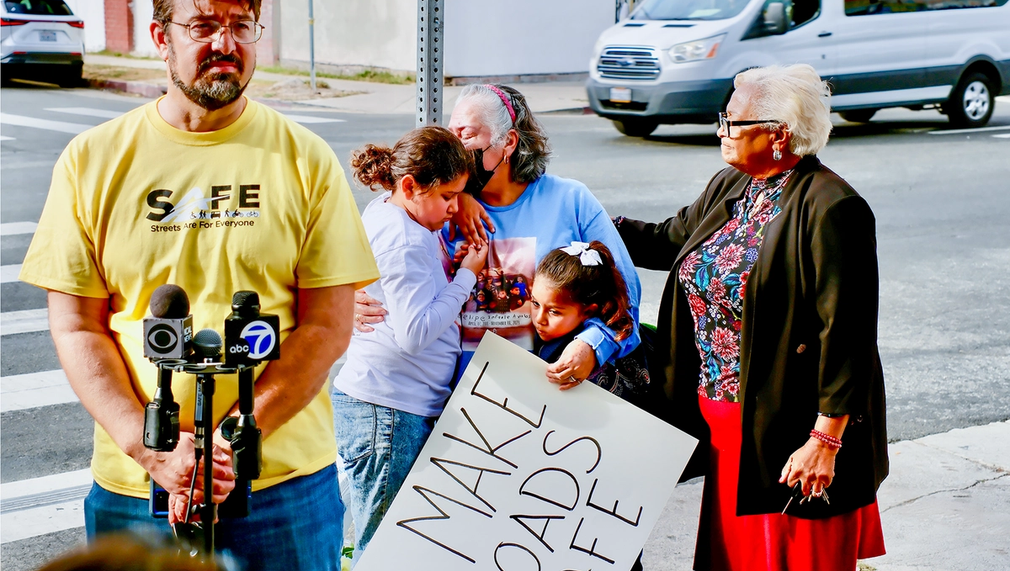Supporting Victims of Traffic Violence
SAFE Support is a unique wraparound social support service for victims of traffic violence – those physically or emotionally traumatized and family members who have lost loved ones in LA County. While SAFE Support has been helping hundreds for the last eight years, we are engaging in a first-of-its-kind pilot with LAPD to provide free support to anyone who’s been through any type of traffic collision in South Los Angeles.

What is the primary issue area that your application will impact?
Social support networks
In what stage of innovation is this project, program, or initiative?
Expand existing project, program, or initiative (expanding and continuing ongoing, successful work)
What is your understanding of the issue that you are seeking to address?
Most Angelenos are one misfortune away from losing everything. In 2023, a record 336 people died in traffic incidents in the City of LA. While 16,514 collisions were reported, it is estimated almost half of all collisions in LA City go unreported due to language barriers, lack of internet access, and complex online LAPD forms. Then there’s the lack of support for those suffering physically, mentally or socially after a collision. Individuals desperately need help to get back on their feet. SAFE Support caseworkers help cases like S.M., whose son was seriously injured in a hit-and-run. S.M. was overwhelmed by paperwork and medical questions. Another victim, M.B., faced homelessness due to medical expenses, while others, like N.C., suffered from mental health issues due to anxiety caused by large unpaid medical expenses. And cyclist S.C., who didn’t own a car, was afraid to ride again after being hit by cars 10+ times while riding his bicycle. And these are just a few examples.
Describe the project, program, or initiative this grant will support to address the issue.
SAFE Support is a free service for victims of traffic violence, helping those who have been traumatically impacted or who have lost a loved one. It offers everything from basic emotional support to help with medical and insurance issues to assistance finding legal representation. We are an ear for grieving and confused families. We dedicate time to researching assistance, freeing survivors to return to daily life. We take the time to ensure victims understand the courts and will even spend the day with them during emotional hearings.
SAFE Support currently services scores of cases every month, primarily from hospitals around LA County. In 2020, the LAPD stopped responding to most traffic collisions and asked those involved to self-report online. This left many confused by the technology, language, or jargon on the forms. SAFE Support aims to bridge the gap and identify other post-trauma needs.
The grant will enable us to expand SAFE Support as part of a unique pilot with the LAPD. This will reduce the LAPD's workload while ensuring survivors receive the comprehensive support they so desperately need. When they are ready, those we help are encouraged to use their voices to help others by working with SAFE to advocate for safer roads. Thus, SAFE Support is part of the solution to traffic violence, working to make the most dangerous roads safer.
Describe how Los Angeles County will be different if your work is successful.
Those who are the most economically challenged and who live in underserved communities like South LA are the most likely to suffer long-term compounding socio-economic ills like homelessness, further mental illness, and addiction after a traumatic traffic collision. With the expansion of SAFE Support, as detailed above, we see a way to catch those who need help before their problems become much more severe. This will save social service resources that are already stretched thin, help uplift individuals, save families, and entire communities. LA roads can be safe for all modes of transportation if more people demand safer roads. Everyone helped by SAFE Support is encouraged to become advocates for safer roads and ambassadors for responsible driving habits. A significant percentage of those we help step up to help SAFE accomplish its mission, thus helping to break the cycle of traffic violence on the roads of Los Angeles.
What evidence do you have that this project, program, or initiative is or will be successful, and how will you define and measure success?
The first metric we track is the number of cases supported and the number of cases who are back on their feet and no longer need our help. For example, S.C. couldn’t travel or work and was in danger of losing their job and home. After months of help, he was back on his feet and now regularly calls us to share another story of how well he’s doing. To ensure SAFE Support maintains a high quality of support, every case helped receives a post-support survey from a separate case worker to gauge the effectiveness and impact of the help received.
The second measurement of success is the number of survivors who have started to become advocates, working at the local, county, and state levels to address the underlying causes of traffic violence. For example, C.E. lost her brother in South LA to street racing. She is now working with SAFE to enact state legislation, meeting with local council members, and speaking to groups about the need to address street racing and street takeovers.
Approximately how many people will be impacted by this project, program, or initiative?
Direct Impact: 1,000.0
Indirect Impact: 1,000,000.0